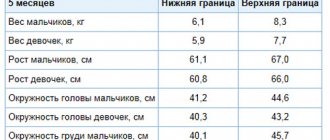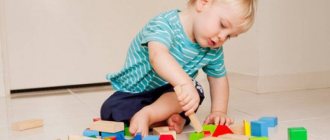When a child poops frequently, this is one of the most common problems with children's bowel movements. This may indicate various problems, including intestinal upset.
But usually young and inexperienced parents can hardly determine what’s wrong, so first you need to find out whether this or that baby’s stool is a deviation from the norm?
How many times should a healthy baby normally go to the toilet per day? The fact is that a small child is not a smaller copy of an adult at all, his body lives according to its own schedule, it also develops specifically, and what is a deviation for an adult is the norm for a baby.
A child poops often: how to react and what to do?
Above we talked about the standards that a baby should fit into. You need to start sounding the alarm if your child poops more than 10 times a day. Changes in color and consistency are also a cause for concern. In this case, you can suspect that the baby has insufficient enzymes.
Sometimes, in case of gastrointestinal dysfunction, they talk about lactose deficiency (lack of the enzyme lactose), in which it is very difficult for the baby to digest breast milk and stool upset occurs - it becomes very frequent and liquid, or, on the contrary, constipation may be tormented. So if your baby poops too often, get a stool test for lactose intolerance to rule out an enzyme deficiency.
In addition to this, pediatricians name several other reasons why a child may defecate too often:
- Diarrhea, or stool disorders, is associated with poor nutrition of the baby. It may be that you gave your child a lot of fruits, which weaken the intestines. This condition can be corrected at home by giving your child anti-diarrhea medications. If diarrhea persists, it is better to consult a pediatrician. Remember that diarrhea for an infant can be very dangerous, so give him water as often as possible, adding a drug like rehydron to the water, which prevents salts from being washed out of the body.
- Intestinal infection. If, in addition to diarrhea, the child also has a fever, you should immediately show him to a doctor. If left untreated, an inflammatory process may develop due to bacteria entering the cracks of the rectum.
- Dysbacteriosis. A fairly common phenomenon characterized by a sharp decrease in “good” bacteria. With dysbacteriosis, an unpleasant odor, loose stools, and undigested pieces of food are observed. You need a doctor's consultation and proper treatment.
STOOL WITH UNDIGESTED FOOD PARTICLES
Particles of food in the stool can be associated with overeating, insufficient chewing of food, feeding foods inappropriate for age, etc. In case of digestive disorders, in addition to pieces of undigested food, the stool may become more liquid with the addition of mucus. If the stool changes suddenly, something bothers the child, or other symptoms appear, you need to consult a doctor.
It’s another matter if you see undigested food particles in the stool during the period of introducing complementary foods. Parents should not worry about this, since the intestines are still immature, they are growing and developing, which means they are simply not able to digest the amount of food that comes to them. If there are no other manifestations (diarrhea, constipation, blood or mucus in the stool), you can simply observe.
Reasons for frequent bowel movements in a child
If a child (2 years old) poops often, why? The reasons for frequent bowel movements in a child of this age can be different. Of these, there are three main ones:
- Lactose intolerance or deficiency. In this case, the stool is watery, sometimes with foam and a sour odor.
- Enzyme deficiency. The digestive system produces many of them. Each of them is responsible for individual batteries. If some enzymes are missing, then normal digestion is disrupted.
- Diarrhea. It can begin due to intestinal infections or poor diet. In any case, you need to limit your child from foods that have a laxative effect (plums, beets, apricots, etc.).
Colic in babies
A child, especially a small one, often farts, and this is the norm; this should not be prevented. Many babies, almost all of them, suffer from intestinal colic, especially in the evenings. And that's okay too. Of course, this causes a lot of inconvenience for parents: the child screams and cries, the whole family tries to calm him down, but little helps. Every mother has their own story about how they deal with colic. The only thing is that they should not be taken for causeless concern. Colic usually begins in the evening. Therefore, it would be advisable to monitor your baby’s behavior throughout the day. If during the day the baby behaves restlessly and cries, then this is a reason to consult a doctor. But if the child “complains” about colic only in the evening, then you just need to get over it. This will go away on its own when the little one’s intestines become stronger.
Do you trust doctors and their prescriptions?
Yes
20.08%
No
13.93%
I trust, but I check all medications for reviews on the Internet from people who have already tried them and only then do I start taking them.
47.95%
Yes, but only to appointments and doctors from paid clinics.
18.03%
Voted: 244
In some cases, parents may notice that the baby's stool has become too liquid, watery, has changed its usual color to brownish or green, and the smell of the stool has changed very much. Unfortunately, it is almost impossible to judge by the color of the stool alone whether the baby has any intestinal disorders. This may be due to purely physiological reasons.
How to help a baby with constipation?
Before starting to treat the problem, it is necessary to establish the nature of constipation. If surgical pathologies are excluded, then therapy can be provided by an adult.
What to do when a child cannot go to the toilet:
massage. Gently stroke your baby's tummy clockwise with your palm or fist; thermal effect. Place the baby in a warm bath or apply a heated diaper to the stomach; prone position. Place the baby on his stomach. Try pressing your legs to your abdominal cavity in this position; mechanical stimulation. While lying on your back, alternately press your baby's legs toward your stomach; enema. Prepare a 20-30 ml syringe for your child. Fill it with cool water or chamomile infusion. Pre-lubricate the anus with baby cream or Vaseline. The tip should be inserted carefully so as not to damage the baby’s delicate intestines; glycerin suppository. Place a suppository in the anus, the active substance will soften the stool and bowel movement will be smooth.
How often should a child go to the toilet?
For the first 1.5-2 months, a baby on breastfeeding soils his diaper on average 2-6 times a day. But sometimes it happens that a child walks only once every 3-5 days. If at the same time he feels well, gains weight, his stools are of a soft consistency and normal color, then there is no reason to worry and to prescribe treatment. The fact is that in infants, in most cases, functional stool retention occurs. This is due to the immaturity of the child’s gastrointestinal tract and is not a disease.
A bottle-fed child pleases his parents with his exploits less often than a baby - 1-2 times a day. For children over one year old, it is normal to go to the potty 1-2 times a day or every other day. Depending on the diet and individual characteristics of the child’s body, the number of trips to the toilet can be from 3-4 times a week to 3-4 times a day. As a rule, every mother knows what kind of stool is normal for a child.
If you notice something unusual in a diaper or potty, you should be wary.
How many times a day should you poop?
For an adult and a child over 1 year of age, the physiological norm is to cleanse the intestines 1-2 times a day. In newborns and infants, defecation occurs more often, which is associated with feeding with mother's milk or artificial milk formulas. It is allowed to cleanse the intestines once every 2 days depending on the individual characteristics of the digestive tract of an adult.
Normal feces have a formal appearance, brown in color, without mucus, streaks of blood and undigested lumps of food, and a putrid odor. Most healthy people have a bowel movement once in the morning. This indicates the proper functioning of the gastrointestinal tract and prepares the body to receive and digest new food. In all other cases, when the stool is liquid, frequent or with impurities, it is necessary to understand the causes of diarrhea.
What should I be able to do (skills)?
- A child at 8 months sits independently and confidently. From a sitting position he tries to get up on his knees and vice versa. If there is support nearby, he always tries to stand up to his full height and takes the first steps along the wall, sofa or crib.
- The baby must do various manipulations with toys. He transfers them from one handle to another, throws them, knocks. Still frequently puts objects into mouth, bites and sucks.
- Motor skills develop, the baby skillfully uses two fingers to grab toys - the thumb and forefinger.
- At this age, the child begins to understand the meaning of simple and short words (“give”, “na”, “let’s go”, “bye”). The baby already understands everything and tries to repeat the sounds. The development of speech is noticeable, the baby speaks with repeated syllables “ma-ma”, “ba-ba”, “pa-pa”, “da-da”.
How many times a day does a baby poop?
The number of bowel movements in infants is determined by the type of food (feeding). If a baby eats breast milk substitutes, they will feel the need less often than babies who are breastfed.
How much should a 1 month old baby poop?
The baby was born, digestion began to work, the newborn’s first stool was meconium. The baby is able to poop 5-6 times a day. After five days, the baby begins to determine its own bowel movement rhythm. A one-month-old baby poops 5 to 10 times. Newborns may poop during or after feeding. A newborn's stool becomes less frequent as the woman transitions from colostrum, with its laxative properties, to mature milk.
How much should a 2 month old baby poop?
Digestion is improved, intestinal function is normalized. And the baby began to empty his bowels less, because an individual regime was established. A two-month-old baby needs about five times. But, if your baby poops only once in two days, then this is also considered a personal norm. But it is important to remember that the act of defecation should take place without effort and tears.
How much should a 3 month old baby poop?
The baby is growing up and has bowel movements less often: 1-2 times every 5 days, and 3-5 times a day. If an infant eats exclusively mother's milk, he may not poop for 3-4 days. There is no reason to worry here, because this means that your milk is very suitable for the baby and is being digested well.
The older the child, the less often he has bowel movements: by 6 months the number of bowel movements is reduced: 2–3 times a day; by one year - the child poops 1-2 times.
Therefore, how often should a newborn poop, that is, the number of bowel movements, is the personal regimen of each baby. The main criteria for a “normal” frequency are:
- regular and painless stool;
- stool without blood (pathological inclusions);
- the baby is in excellent health;
- The baby is gaining weight.
How much to poop per day is a matter of much debate among people. Is the frequency of going to the toilet so important? Is it the same for everyone? In fact, there is no universal answer to the question of how much to poop per day. All people are different and it is considered normal if a person goes to poop from three times a day to three times a week. There are also reports of people pooping after every meal. Today we will talk about how much to poop per day. Our next article on the website gastritinform.ru will dispel your doubts, and most importantly, remember that it is not so important how many times a day a person should poop as his sensations and comfort in the digestive tract.
Let's work together to make the unique material even better, and after reading it, we ask you to repost it on a social network convenient for you. net.
How long should you sleep and stay awake?
A baby's daily routine remains unchanged until 18 months. A child should sleep about 10 hours at night. It often happens that in the evening at 21.00 it is difficult to put him to bed, and in the morning the baby does not allow mom and dad to sleep from six in the morning. Therefore, sleep adjustments within one hour are acceptable. During the day there are three periods when a child should be awake: from 7.00 to 10.00 in the morning, from 12.00 to 15.00 at noon and from 17.00 to 21.00 in the evening. There are certain recommendations for how a child should sleep during this period of life. According to the regime, you need to go to bed twice during the day: from 10.00 to 12.00 and from 15.00 to 17.00.











